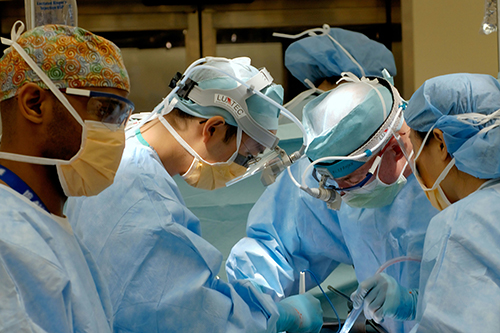
Photo by National Cancer Institute on Unsplash
The NIHR Bristol Biomedical Research Centre (BRC) - hosted by the University of Bristol and University Hospitals Bristol and Weston NHS Foundation Trust (UHBW) - is bringing together 12 other BRCs to host a translational research collaboration focusing on surgery and perioperative care.
The new NIHR Translational Research Collaboration in Surgery and Perioperative Care (known as the SPOC TRC) will support collaborations between innovators, researchers, industry and charities to develop and deliver early-phase translational research.
Translational research focuses on testing the safety and impact of innovations and examining how new procedures lead to patient benefit. At present, this type of research is limited in surgical and perioperative care because of the complexities of interventions. Interventions have multiple steps and often use various devices.
The oversight of innovation in this field is also different from that required to develop new drugs. This complexity makes research more challenging and problems have occurred in recent decades. One example is vaginal mesh surgery, which was used in pelvic organ prolapse and stress urinary incontinence. In 2018, the UK government and NHS implemented a pause on vaginal mesh surgery, following safety concerns and recommendations from the Independent Medicines and Medical Devices Safety Review.
The Bristol-led NIHR TRC aims to improve patient safety, drive innovative approaches to care, make innovation more patient-centred and develop capacity and expertise in the field of surgery and perioperative care research.
It will do this by:
- Creating a network of surgeons, researchers and clinicians who can work together to undertake early phase, translational studies in this field
- Training the next generation of clinician innovators in research skills
- Addressing health inequalities by understanding the inclusivity in early phase studies and considering how to improve these to ensure they reflect the diversity of our population
- Managing demand, ensuring patients on waiting lists will benefit from interventions
Jane Blazeby, Professor of Surgery at the University of Bristol, Honorary Consultant Surgeon and Chair of NIHR SPOC TRC, said: "The new TRC is a fantastic opportunity because it will facilitate research across specialist centres. By working together, we hope to speed up innovation. This will particularly benefit patients with rare conditions, such as rare cancers.
"It will also help to raise awareness and begin the long-needed process of transforming how innovation in surgery and perioperative care occurs.
"Through working in partnership, we will be able to tackle this area of unmet need in a way that would not be possible by centres working alone. By working with the UK's leading experts in this field we aim to accelerate the introduction of safe and efficient treatments in a way that was previously unattainable."
Natalie Owen, Head of NIHR Research Infrastructure, added: "The new SPOC TRC is a significant move to enhance patient outcomes and ground surgical procedures in evidence-based research. It will foster multidisciplinary collaboration, bringing together experts across disciplines and is poised to make a significant contribution to the advancement of surgical care and patient safety in the NHS."






